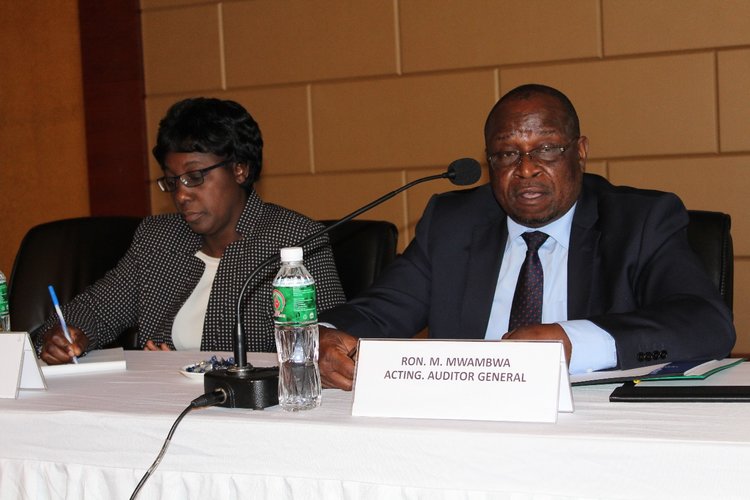SPECIAL AUDIT REPORT ON PROCUREMENT AND MANAGEMENT OF PETROLEUM PRODUCTS FOR THE PERIOD 1ST JANUARY 2019 TO 31ST DECEMBER 2022
Notice: Undefined index: catFilterList in /home/zambi/public_html/wp-content/plugins/wp-likes/api.php on line 243
SPECIAL AUDIT REPORT ON PROCUREMENT AND MANAGEMENT OF PETROLEUM PRODUCTS FOR THE PERIOD 1ST JANUARY 2019 TO 31ST DECEMBER 2022
By Derrick Sinjela
Acting Auditor General, Dr. Ron Mwambwa has issued the Special Audit Report on Procurement of Petroleum Products for the period 1st January 2019 to 31st December 2022 which has revealed financial and other irregularities.
This Report has been produced in accordance with Article 250 of the Constitution of Zambia (Amendment) Act No. 2 of 2016, Public Audit Act No. 13 of 1994 and Public Finance Management Act No.1 of 2018.
In a Thursday, 28th March, 2024 Press Release circulated by
Head of Public Relations Ellen M. Chikale, Dr. Mwambwa alluded to Section 5 (1) of the Public Audit Act No. 13 of 1994 which states: “Whenever the Auditor General has reason to believe that delay in reporting serious irregularities in the expenditure of the public funds through his annual report may occasion financial loss to the Government or prejudice effective financial control, he shall forthwith prepare such special, interim or other audit report relating to audit investigation into such serious irregularities as he considers necessary to prevent or reduce any financial loss to the Government”.
The Special Report has highlighted financial irregularities amounting to K483,274,318 and US$1,396,111,768 in the procurement of petroleum products.
One of the notable audit findings is the failure to pay suppliers of petroleum products in amounts totalling US$898,440,122. Included in the amount were interest charges and risk premium in amounts totalling US$452,152,462.16 due to delayed payments and this represented 50.3% of the outstanding amount.
Another notable irregularity involved the overpayments to suppliers of petroleum products, totalling $36,373,827. This occurred due to inflated invoices, suggesting a potential motive of deliberate fraud.
The Report also cites the loss incurred from the sale of petroleum products, totalling $197,815,520. An examination of profitability and loss reports on commingled feedstock for the period from April 2017 to August 2021 revealed that this loss stemmed from subsidies, which entail the selling of the products at a price that is lower than the procurement cost.
The report further cites Wasteful Expenditure on arbitration awards that were granted against the Government, alongside legal fees and arbitration costs in amounts totalling $40,895,182.
These expenses arose from questionable decisions made by Government Officials which led to the Government incurring these costs which ordinarily could have been avoided and for which there was no value that was derived.
Other irregularities are Irregular charging of Traders Margin of $58,550,400.
A trader’s margin is paid to a trader who procures petroleum products from the refinery on behalf of the supplier. An examination of the price schedule revealed that the supplier included a trader’s margin cost component in the price build up and consequently was paid US$58,550,400 as trader’s margin without the approval of the Ministry contrary to the supplier’s contract which as at 31st January 2024, had not been recovered.
In addition, there was Loss of Funds due to questionable contract clauses amounting to $34,349,962 among others.
To address the various audit findings observed during the audit process, Dr. Mwambwa recommends that the Ministry of Energy should submit procurement plans for the procurement of petroleum products to the Zambia Public Procurement Authority (ZPPA) in line with the Public Procurement Act No. 8 of 2020 to avoid uncompetitive/emergency procurements.
Dr. Mwambwa recommends that the Ministry of Energy should ensure that funds are secured before commencement of projects to avoid incurring interest charges due to delayed payments and that before engaging in direct bidding, all alternative options are exhausted to avoid contravention of public procurement guidelines and elimination of competition.
Dr. Mwambwa equally recommends that the Ministry of Energy should put in place mechanisms to ensure that terms and conditions of contracts are thoroughly scrutinised by the Ministry Procurement Committee and the Attorney General before final award of contracts to successful bidders in order to mitigate loss of public funds through onerous/ambiguous contract clauses, among others.
Dr. Mwambwa has urged all stakeholders that are involved in the procurement and management of petroleum products to exercise maximum prudence in the management of public resources and hopes that remedial action will be taken on the issues raised in the report.
The Audit Findings mentioned in the Report are those which were not resolved during the audit process.

Acting Auditor General, Dr. Ron Mwambwa (right).





















